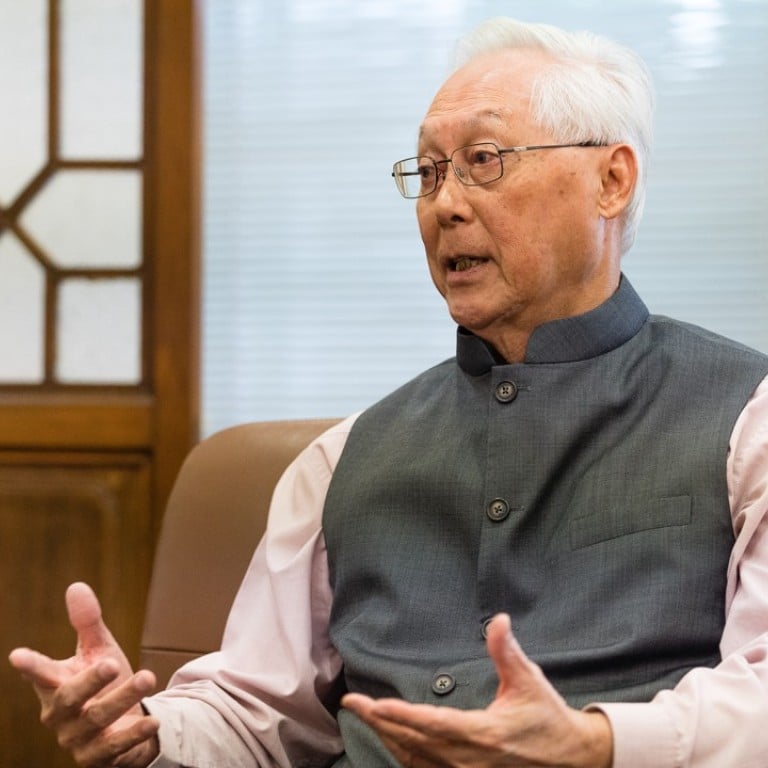
On Lee Kuan Yew’s Sentosa nudist colony idea, being a ‘seat warmer’ and the politician he’d never speak to: former Singapore Prime Minister Goh Chok Tong tells all in his new book
- Tall Order: The Goh Chok Tong Story is a portrait of Singapore’s second prime minister trying to find his own voice in the shadow of his predecessor
As the book puts it, he was an improbable prime minister for an unlikely country – he had neither the connections nor the cunning to rise to the top. He was an ordinary man, except for his imposing 1.89 metre height, uncommon in Asia.
His government career was marked by domestic policy wins and successes in expanding Singapore’s economic space overseas. But it was also fraught with political stumbles and humiliation by Lee, a man he described as both his mentor and kung fu master.
The book, written by Singaporean journalist Peh Shing Huei, is available on Amazon.com and in major bookstores across Asia. Here are excerpts of the book and selected Q&A with Goh.
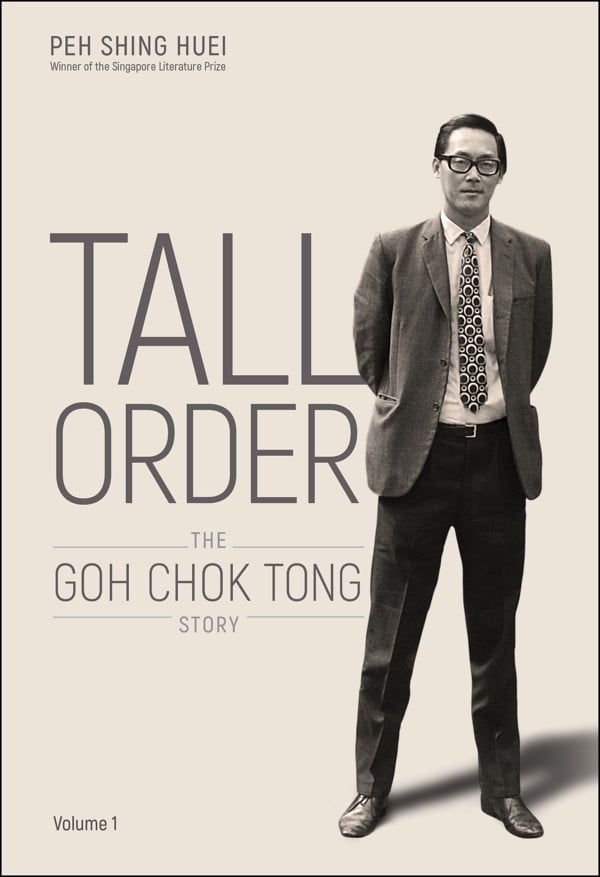
Chapter 10: This is Me
But Lee Kuan Yew was not done yet. A week later, during a forum with students at the National University of Singapore (NUS), he brought up the topic of leadership succession. In particular, he explained and elaborated on his criticisms of Goh. “If I am just one paean of praise, it’s like selling detergent, it’s a waste of time,” he said.
Lee complimented Goh effusively, praising his integrity for being incorrupt in Neptune Orient Lines (NOL), turning the shipping line around, and being unafraid of competition. Of the 61 new candidates fielded by the PAP in the 1980, 1984 and 1988 elections, 30 of them were talent-spotted by Goh. “He’s not afraid of able men,” said Lee.
However, he also brought up Goh’s weaknesses again. “He is unable to convey publicly through television and through mass meetings what he can convey in individual, face-to-face or small group discussions,” said Lee.
“I don’t know why. I have suggested to him, perhaps, a bit of psychological adjustment, maybe a psychiatrist, something holds him back. He is, before a mass audience, he gets wooden – which he is not. When you speak to him one-to-one, he has got strong feelings. Get him on television, it’s difficult. He has improved, I will say about 20 per cent. He needs to improve by more than 100 per cent.”
As is usually the case, and as predicted by Lee, his praises of Goh at NUS were quickly forgotten. Instead, it was the brickbats, especially the “wooden” comment, which went viral at an age when the word “viral” was usually associated with the spread of viruses. It might as well have been, such was the infectious impact of the “wooden” label.
In post-Lee Kuan Yew era, can Singapore still walk tall on global stage?
In fact, it would not be an exaggeration to say that the word, for better or worse, has remained closely associated with Goh since. Even Goh himself admitted his memory of the event has been reduced to that one comment. “All I remember was ‘wooden’. The rest I cannot remember,” he said candidly.
To me, a psychiatrist is a medical practitioner specialising in the diagnosis and treatment of mental illnesses. Is nervousness when facing a crowd a mental illness?
But he refused to let it break him. “Just take it one more time. I did not fall the first time. What is one more time?” he said.
“It was not the ‘wooden’ part that disturbed me because I knew my own communicative abilities – that was not a problem. The part that upset me was to see a psychiatrist because that could be thoroughly misunderstood by people. So, what else could you do? Had I gone out to explain why I would not see a psychiatrist, then of course, I had to see one. People would laugh at you. So, I just shrugged it off.”
It upset others in the cabinet too, such as Ahmad [Mattar].
“I was infuriated and upset when I heard the advice he had given to Goh Chok Tong. Psychiatrist? See a psychiatrist to loosen up?” he said, his voice raised. “To me, a psychiatrist is a medical practitioner specialising in the diagnosis and treatment of mental illnesses. Is nervousness when facing a crowd a mental illness?”
For Goh, a deep trust in Lee helped him cope during that dark month of August 1988. “He did not do this to destroy me – I was not his political opponent. If I were his political opponent and he wanted to destroy me and put somebody of his choice up, like his son, then that would be different,” he said. “It was not behind the back sort of stabbing. It was very open, so you did not get angry with that.”
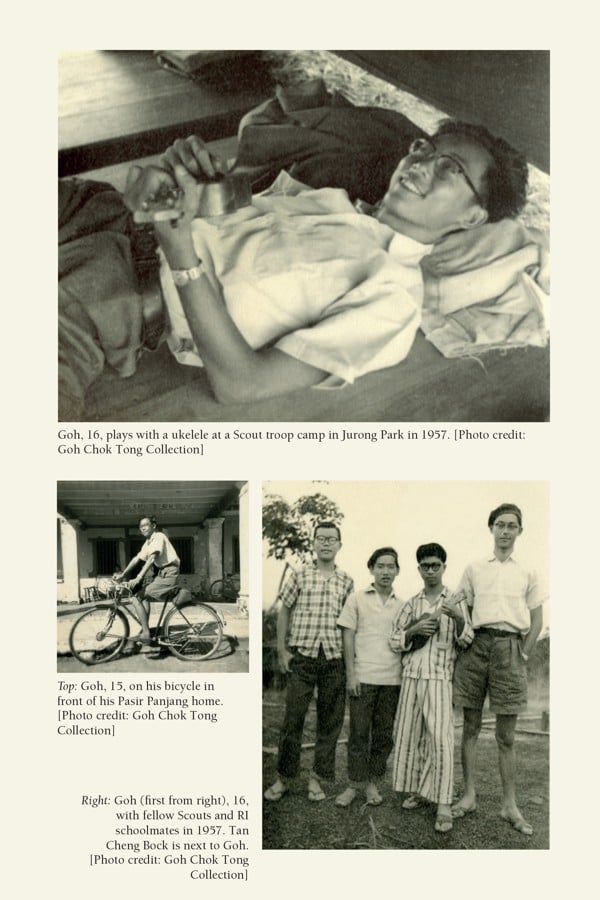
Q&A
On bringing Lee Hsien Loong, the current prime minister, into politics
Q: Let me play the devil’s advocate. Maybe Lee Kuan Yew expected you to suggest Lee Hsien Loong because he is of that particular age and he is very bright and almost like an obvious candidate. And, true enough, you did. If he didn’t, maybe something would have happened?
A: Correct. But not that something would have happened. He told Rajaratnam later he was surprised I was not afraid of competition. He looked at it that way – that Goh Chok Tong suggested we look at Lee Hsien Loong. It showed that I was not afraid of competition. This was before the 1984 election. Hsien Loong came in in 1984 as a young man. When would Lee Kuan Yew step down? We did not know yet in 1984. So, if Lee Hsien Loong came in, he could do very well in a matter of two to three years and Lee Kuan Yew might have said, let it be an open competition between him and others.
Instead, Lee Kuan Yew saw it the other way around. If I did not suggest Hsien Loong, then he could have said, ‘My god, this fellow is afraid of competition. It was right in front of his eyes – this bright young man – and he did not spot him!’. Or I could have been clever, anticipated all these, and told Lee Kuan Yew that I had approached Hsien Loong and he said his family situation was such and he was not interested. I could have left it as such.
Singapore says final farewell to its founding father Lee Kuan Yew
Then I delay it by four or five years, you see. And I could play the game and not bring him in in 1984, but wait till he was more ready in 1988 or even later. Then my position as successor would be stronger. But I was in politics for the country and not for myself.
Q: Lee Kuan Yew said much later that Lee Hsien Loong could not succeed him directly and he used the analogy of the gears. He said the two gears would not engage properly. So, you are like the …
A: Seat warmer.
Q: He did not say seat warmer.
A: Of course, he would not say so. It was the public who put it that way.
Q: He meant that he and his son could not engage correctly, they would clash.
A: He was correct. I think that is a nice way of putting it because Hsien Loong does have very strong views on certain things and the father also had certain views of certain things. And on some of these views – they clashed. I had seen in cabinet, Lee Hsien Loong putting up a different view from the father. The father wanted one way and Hsien Loong said, no, and they would clash. Hsien Loong is not a yes-man on things he believed in. So, what would I be in the analogy – a lubricant? (laughs).
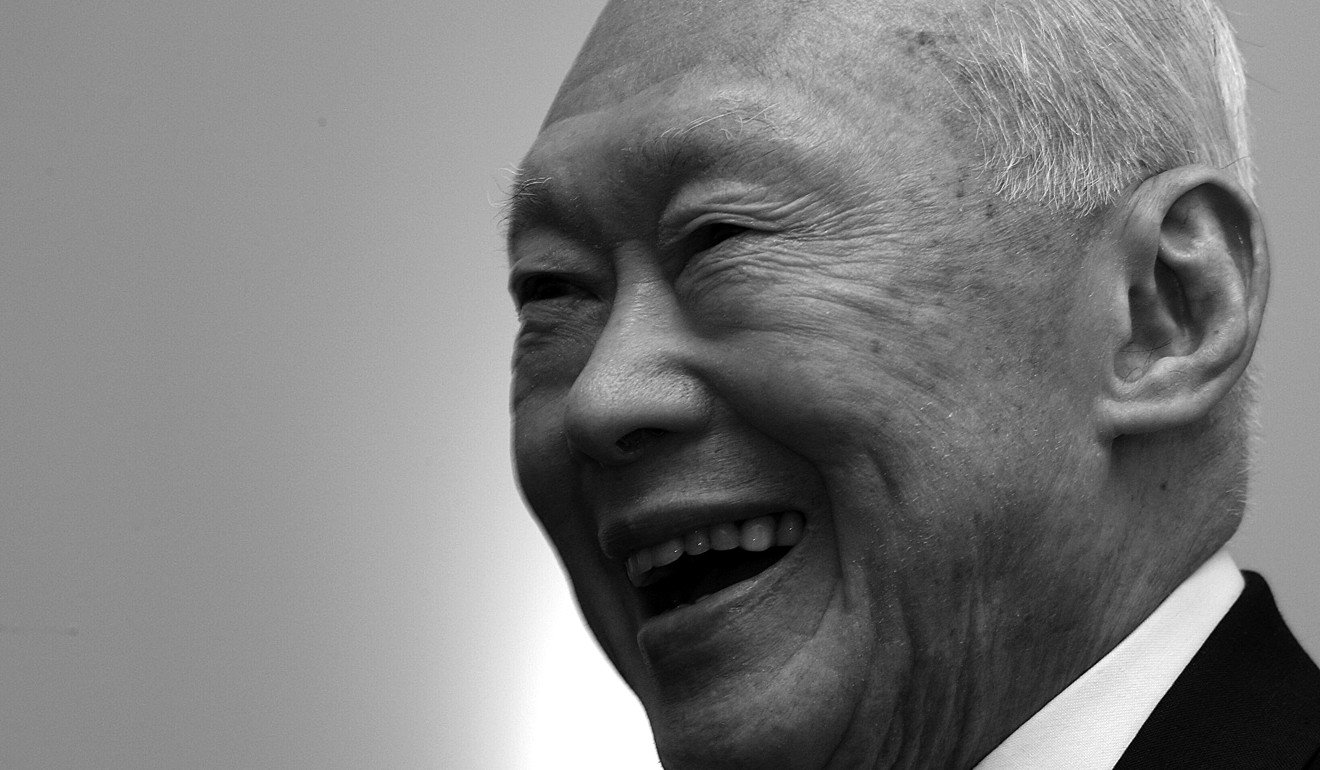
Q: So given all the rumours and allegations of a dynasty, why did you think it was still worth it to bring Lee Hsien Loong into politics?
A: The cost may be the rumours, but we do not worry about these things too much. We would go for the essentials. What is the interest and the truth? I can say all these quite sincerely and honestly because we know what happened in the selection process. What thoughts Lee Kuan Yew had – I did not know. But I know for a fact that he never told me that there was a bright young man in the armed forces; why don’t you ask him? I got him in. Lee Kuan Yew also never asked what about Hsien Yang. But one day, later on, he suggested his daughter. He said Wei Ling would make a very good MP.
But in cabinet, how could I succeed as a PM if the father was there, the elder son and the second son too? Nobody would believe I am my own man, isn’t it? With three – what chance would you have?
Q: When was this?
A: I cannot remember now, but probably when I was still DPM. I was looking for candidates. The reason LKY suggested her was that Wei Ling had very strong compassion for the down and out. She had a very strong sense of justice. Anything which did not seem just to her – she would push. So, he suggested. What did I do? Quietly, I sounded out George Yeo. He was chairman of Young PAP and he was politically significant. He said no. Then I sounded out Hsien Loong. Hsien Loong also said no. And that was enough. Then I kept quiet after that.
Q: But with Lee Hsien Yang – it never came up?
A: He never mentioned Hsien Yang. I thought of Hsien Yang, but I did not recommend him because I think he would be outshone by his brother. Having two brothers in Parliament was okay – Bernard Chen and Kenneth Chen, at one time. But in cabinet, how could I succeed as a PM if the father was there, the elder son and the second son too? Nobody would believe I am my own man, isn’t it? With three – what chance would you have?
I mean, that was how people would think, not knowing we are different individuals. Hsien Yang, had he come in, he would be different from the brother. These are not yes-men. You see the situation now, he is fighting the brother. He would be a different individual with different qualities. His value would be – had I been interested, and that was later on – experience in the private sector. Hsien Loong did not have it.
So, it came back to the basics, because Lee Kuan Yew was a very honourable person. You think he would cause us to do things, but no. He would treat you as an equal and then respect your opinion and so on. It was not that he said, you do this, you do that. If that was the case, he would not have gotten Tony Tan, myself and Dhanabalan to work for him.
Q: Speaking of women candidates and the Lee family, did you speak to Ho Ching at any point about joining politics ?
A: I knew you would ask! I did approach Ho Ching and ask her if she would be interested in politics. It was quite early on. She was about 28, 29 or 30, before she married Hsien Loong. I spotted her in Mindef [the Ministry of Defence] and thought that she had the intellect and attributes we were looking for. I knew she was a President’s Scholar, but I didn’t know her well – only superficially because she was in the science part of Mindef.
‘Worse than the Kardashians’: Lee Kuan Yew family feud turns ugly
Through briefings and so on, I could see that she had a lot of substance. She would have made a good minister, a different kind of minister. She did not say no. She said not at this stage. She was still young. After that, I was overtaken by events! She and Hsien Loong got married. As she was part of the Lee family, I never approached her again. I would not have asked her to be a politician. Hsien Loong would be against it. She would be against it. And Singapore would be against it.
On his path to becoming PM
Q: How did Lee Kuan Yew tell you that he was ready to hand over to you?
A: I was quite happy as he was doing the job of PM. He was still young and I was in no hurry. But in early 1990, over lunch, he told me that I should take over now. I was to pick a date and take over. So, the man was true to his words that he would hand over. He could not do so at 65 as he felt I was not ready. In 1990, he just said I was to take over. So, I said yes. That was all. That was how transition took place in Singapore. Elsewhere, they fought and so on.
He added that he thought he should stay on in Cabinet. Was it because he wanted to play a role or he was not fully confident in me? I think he was not fully confident. Indeed, he would not be immediately confident in anyone taking over from him. He wanted to guide and help; not to direct and control.
Q: When he said he should stay on in cabinet, did that come as a surprise to you?
A: Not really, I was quite happy. It was better to have Lee Kuan Yew inside than outside! Remember his remark about rising from the grave if things went wrong? If things went wrong, would he have kept quiet? Would he have said that this is a new PM, he would watch and he would not interfere right away? In 1988, I was very relieved he was going to carry on for two more years. By 1990, I was ready. In my heart, I was ready.
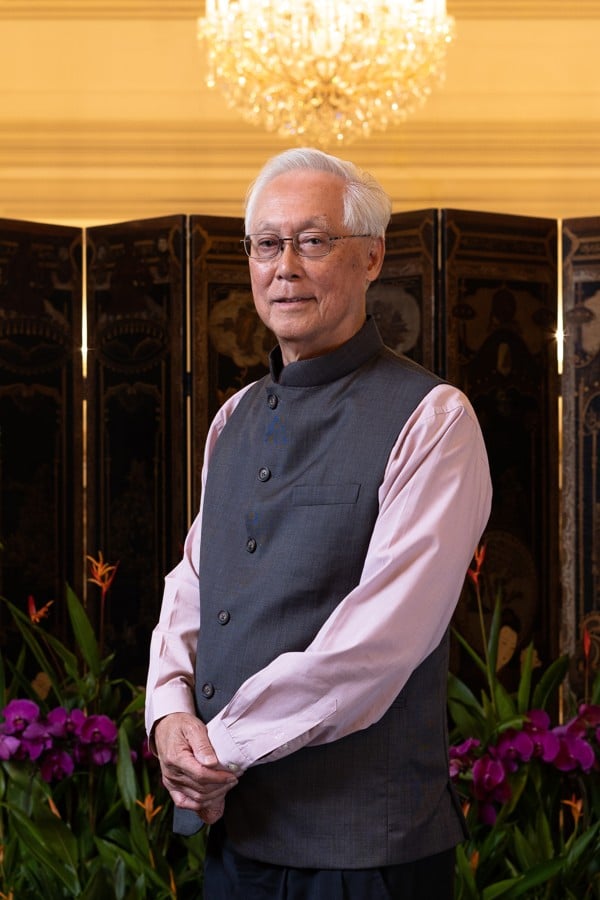
His views of opposition party leaders
Q: Would you be friendly with long-time opposition MPs like Chiam See Tong and Low Thia Khiang too?
A: I regard Chiam as a friend.
Q: As a friend?
A: As a friend, yes. I have seen him at dinners outside. He would come to me and I would go and talk to his wife and so on. If I see the wife, I would ask her how Chiam is. He was a gentleman politician. He had his own purpose in politics, which is to create a two-party Parliament. There is nothing wrong with that. We did not like it, but we said you try, so he tried.
Q: Would that be the same towards Low?
A: It is the same with Low. In fact, with most of the people, it is the same thing. We always watch. What is the purpose, their aspirations, their goals and would they bring Singapore down? Or would they be just difficult opponents for us? Then we got to be better than them. So, if they are honest and honourable and want to do good for Singapore even though it is in a different way, well, we can have a debate on that. But if your views are totally wrong in our view, like promising a welfare state and using the reserves, then we would fight you. We would fight you tooth and nail on your wrong-headed and populist approach.
Q: So who would be someone whom you would not speak to?
A: Chee Soon Juan.
Francis Seow and Tang Liang Hong suffered more politically than Chee, but they were respectful and friendly. Chee Soon Juan, wherever he was, was my opponent
Q: Is it because he was your toughest opposition opponent?
A: No. His character is so flawed, he cannot be a tough opponent. To put it in a general way, the toughest opponent is actually PAP’s success. And the wish of the people to have alternative voices in Parliament. That is the toughest opponent because we have succeeded and won so many seats and the people, not just opposition, say, no, they want to hear alternative voices. We could encourage, as we did, PAP MPs to be critical, to be honest in their criticism, to speak out. But the people say – all of you are of the same mould; they want somebody different. That is the toughest opponent. In other words, it is a situation of success and total dominance.
So, if you ask which individuals would pose problems? They are not troublesome, but they are tough in a sense that they would fit the mood of the people. So, Chiam would be tough to get out of Potong Pasir because he fitted the thinking of the people and is decent, a middle-of-the-road kind of an MP. If you want to campaign against him, it would be very difficult to get him out. So, it was tough in that sense. Low would also fit that mould. Once he had won, it would be difficult to get him out. Politically, he is sharper, compared with Chiam. If you want to debate against him to get him out, it would be difficult. He is shrewd.
Chee is flawed. He tried so many times but people have sized him up. They would not want him. Chee flew all the way to Williams College to slam Singapore during my conferment. On another occasion in the States, he went without an invitation to a by-invitation event where I was speaking. He entered the room midway through the forum and asked a question on Malays, how we treated the Malays. That is a troublemaker. Francis Seow and Tang Liang Hong suffered more politically than Chee, but they were respectful and friendly. Chee Soon Juan, wherever he was, was my opponent.
Afterword – Chapter 8: From Nanny to Buddy
I wanted a kinder and gentler society. I believed that a consultative, participative democracy would release the energy to drive Singapore to its next phase. I wanted all Singaporeans to play a part. I wanted them to be stakeholders in shaping Singapore’s future with the government.
Lee Kuan Yew was initially disdainful of my consultative style. He thought it wasted time. But it worked for me, and Singapore. I stayed true to my pledge that I would walk in my own pair of shoes, not his.
‘Three Lees is too much’: Goh Chok Tong on leading Singapore after Lee Kuan Yew
“Kinder and gentler” also led to the tilt towards a more liberal film censorship rating system. However, while the younger, English-educated Singaporeans supported this tilt, the conservative segments, particularly the non-English educated, were uncomfortable.
As an aside, Lee Kuan Yew was more liberal than we think. Or more practical. When the tourism sector was down, he floated the idea of allowing a nudist colony on Sentosa or an offshore island to bring them in! The younger ministers vetoed him.
Society is not frozen in time. Each successive generation of leaders must express their own and Singaporeans’ ideals for Singapore. Find your own style of government and ways to gain the people’s trust.
